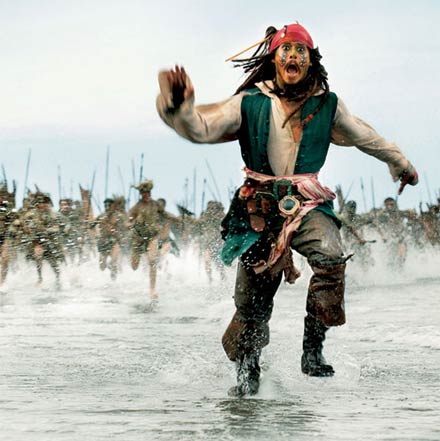Look at it well. This was the good town once,
Known everywhere, with streets of friendly neighbours,
Street friend to street and house to house. In summer
All day the doors stood open; lock and key
Were quaint antiquities fit for museums
With gyves and rusty chains. The ivy grew
From post to post across the prison door.
The yard behind was sweet with grass and flowers.
A place where grave philosophers loved to walk.
Old Time that promises and keeps his promise
Was our sole lord indulgent and severe,
Who gave and took away with gradual hand
That never hurried, never tarried, still
Adding, subtracting. These our houses had
Long fallen into decay but that we knew
Kindness and courage can repair time's faults,
And serving him breeds patience and courtesy
In us, light sojourners and passing subjects.
There is a virtue in tranquillity
That makes all fitting, childhood and youth and age,
Each in its place.
Look well. These mounds of rubble,
And shattered piers, half-windows, broken arches
And groping arms were once inwoven in walls
Covered with saints and angels, bore the roof,
Shot up the towering spire. These gaping bridges
Once spanned the quiet river which you see
Beyond that patch of raw and angry earth
Where the new concrete houses sit and stare.
Walk with me by the river. See, the poplars
Still gather quiet gazing on the stream.
The white road winds across the small green hill
And then is lost. These few things still remain.
Some of our houses too, though not what once
Lived there and drew a strength from memory.
Our prople have been scattered, or have come
As strangers back to mingle with the strangers
Who occupy our rooms where none can find
The place he knew but settles where he can.
No family now sits at the evening table;
Father and son, mother and child are out,
A quaint and obsolete fashion. In our houses
Invaders speak their foreign tongues, informers
Appear and disappear, chance whores, officials
Humble or high, frightened, obsequious,
Sit carefully in corners. My old friends
(Friends ere these great disasters) are dispersed
In parties, armies, camps, conspiracies.
We avoid each other. If you see a man
Who smiles good-day or waves a lordly greeting
Be sure he's a policeman or a spy.
We know them by their free and candid air.
It was not time that brought these things upon us,
But these two wars that trampled on us twice,
Advancing and withdrawing, like a herd
Of clumsy-footed beasts on a stupid errand
Unknown to them or us. Pure chance, pure malice,
Or so it seemed. And when, the first war over,
The armies left and our own men came back
From every point by many a turning road,
Maimed, crippled, changed in body or in mind,
It was a sight to see the cripples come
Out on the fields. The land looked all awry,
The roads ran crooked and the light fell wrong.
Our fields were like a pack of cheating cards
Dealt out at random - all we had to play
In the bad game for the good stake, our life.
We played; a little shrewdness scraped us through.
Then came the second war, passed and repassed,
And now you see our town, the fine new prison,
The house-doors shut and barred, the frightened faces
Peeping round corners, secret police, informers,
And all afraid of all.
How did it come?
From outside, so it seemed, an endless source,
Disorder inexhaustible, strange to us,
Incomprehensible. Yet sometimes now
We ask ourselves, we the old citizens:
‘Could it have come from us? Was our peace peace?
Our goodness goodness? That old life was easy
And kind and comfortable; but evil is restless
And gives no rest to the cruel or the kind.
How could our town grow wicked in a moment?
What is the answer? Perhaps no more than this,
That once the good men swayed our lives, and those
Who copied them took a while the hue of goodness,
A passing loan; while now the bad are up,
And we, poor ordinary neutral stuff,
Not good nor bad, must ape them as we can,
In sullen rage or vile obsequiousness.
Say there's a balance between good and evil
In things, and it's so mathematical,
So finely reckoned that a jot of either,
A bare preponderance will do all you need,
Make a town good, or make it what you see.
But then, you'll say, only that jot is wanting,
That grain of virtue. No: when evil comes
All things turn adverse, and we must begin
At the beginning, heave the groaning world
Back in its place again, and clamp it there.
Then all is hard and hazardous. We have seen
Good men made evil wrangling with the evil,
Straight minds grown crooked fighting crooked minds.
Our peace betrayed us; we betrayed our peace.
Look at it well. This was the good town once.’
These thoughts we have, walking among our ruins.
Edwin Muir
 I want to thank profusely the innumerable folk who have promised to pray for me, put my name on prayer-lists, visit Adoration Chapels tomorrow during my surgery to take care of a wayward "transitional cell carcinoma of the renal pelvis."
I want to thank profusely the innumerable folk who have promised to pray for me, put my name on prayer-lists, visit Adoration Chapels tomorrow during my surgery to take care of a wayward "transitional cell carcinoma of the renal pelvis."


















